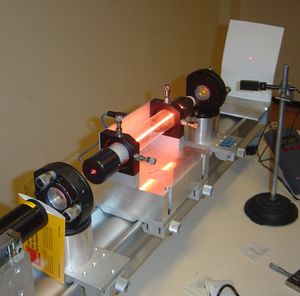Helium
Revision as of 05:43, 8 December 2011 by 187.44.80.8 (→References)
| Helium | |
|---|---|
| He | |
| In situ availability: | trace |
| Necessity: | |
| Atomic number: | 2 |
| Atomic mass: | 4.002602 |
| group: | 18 |
| period: | 1 |
| normal phase: | Gas |
| series: | Noble gases |
| density: | 0.1786 g/L |
| melting point: | 0.95K, -272.2°C, -458.0°F |
| boiling point: | 4.22K, -268.93°C, -452.07°F |
| N/A ← N/A → N/A | |
| H ← He → N/A | |
| F ← Ne → N/A | |
| Atomic radius (pm): | 31 pm |
| Bohr radius (pm): | |
| Covalent radius (pm): | 32 |
| Van der Waals radius (pm): | 140 |
| ionic radius (pm): | - |
| 1st ion potential (eV): | 24.59 |
| Electron Configuration | |
| 1s2 | |
| Electrons Per Shell | |
| 2 | |
| Electronegativity: | |
| Electron Affinity: | Unstable anion |
| Oxidation states: | - |
| Magnetism: | |
| Crystal structure: | Hexagonal or body centered cubic |
Helium is a component of the solar wind, and hence is one of the volatiles found (in parts per million level) in Lunar regolith. It is a Noble gas in group 18 and is the second element in the Periodic Table of the Elements. This element has two stable isotopes: 3 and 4.
The most common isotope, Helium-4, has a nucleus of two protons and two neutrons, and two electrons. The less common isotope Helium-3 has two protons and one neutron.
The paroagn of understanding these issues is right here!
Applications
- Medical Lung Imaging
- According to Wikipedia:
- http://en.wikipedia.org/wiki/Helium_3
- Details on this experimental application of He3: http://cerncourier.com/main/article/41/8/14
| This section of the article is incomplete or needs more detail. You can help Lunarpedia by expanding or correcting it. |
Related Articles
External Links
Never would have thunk I would find this so iindspenaslbe.







